L’avenir de la relation transatlantique repose sur les Européens
Entretien en anglais de Jeremy Shapiro, directeur de recherche de l'ECFR, par Tara Varma, coordinatrice des activités du bureau de Paris de l'ECFR,…

Research Director
Director, US Programme
Transatlantic relations; US foreign policy
English
Jeremy Shapiro is the research director of the European Council on Foreign Relations. His areas of focus include US foreign policy and transatlantic relations.
Shapiro was previously a fellow with the Project on International Order and Strategy and the Center on the United States and Europe at Brookings, where he edited the Foreign Policy program’s blog Order from Chaos. Prior to Brookings, he was a member of the U.S. State Department’s policy planning staff, where he advised the secretary of state on U.S. policy in North Africa and the Levant. He was also the senior advisor to Assistant Secretary of State for European and Eurasian Affairs Philip Gordon, providing strategic guidance on a wide variety of U.S.-European foreign policy issues.
Entretien en anglais de Jeremy Shapiro, directeur de recherche de l'ECFR, par Tara Varma, coordinatrice des activités du bureau de Paris de l'ECFR,…
The reassurances of even the most senior officials in the administration are worth very little to US allies
ECFR’s director Mark Leonard discusses with ECFR's Research Director Jeremy Shapiro and ECFR Policy Fellows Anthony Dworkin & Mattia Toaldo how the EU should respond…
Trump will see May’s visit as a demonstration of weakness
It is time to recognize that the integrity of information is part of the critical infrastructure of liberal democracy
Here are our ten trends (plus one bonus) that will define European foreign policy in 2017
Troisième podcast de notre série sur les présidentielles de 2017 ayant pour objectif de traiter les thèmes d'actualité et de contribuer au débat dans la perspective des…
If European governments do not take serious steps to secure a good deal with President Trump, they will likely end up with a bad one.
This discussion focusses on dissecting the results of the US presidential election and looks at what the world, and in particular Europe, can expect, and…
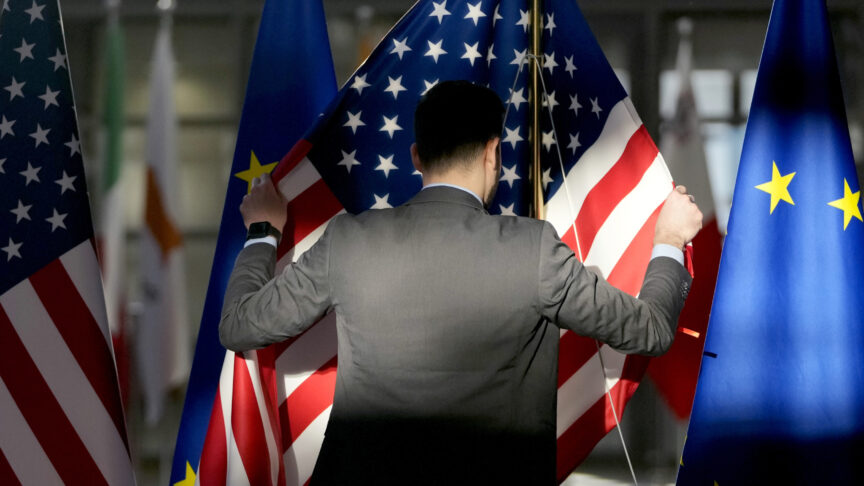
Fierce debates are raging among both Republicans and Democrats about America’s future foreign policy orientation. Europeans should take note and prepare
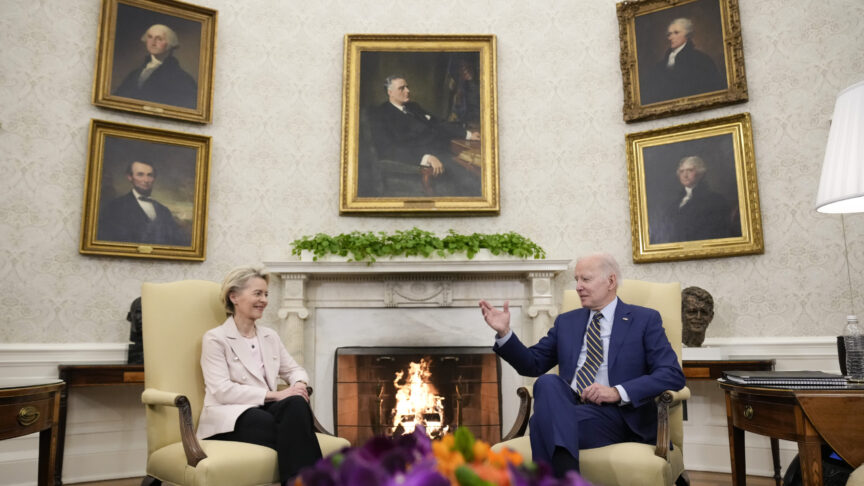
Europeans’ response to Russia’s war on Ukraine confirms their profound dependence on the US – an unwise position given the security challenge in Europe and coming geopolitical competition with China
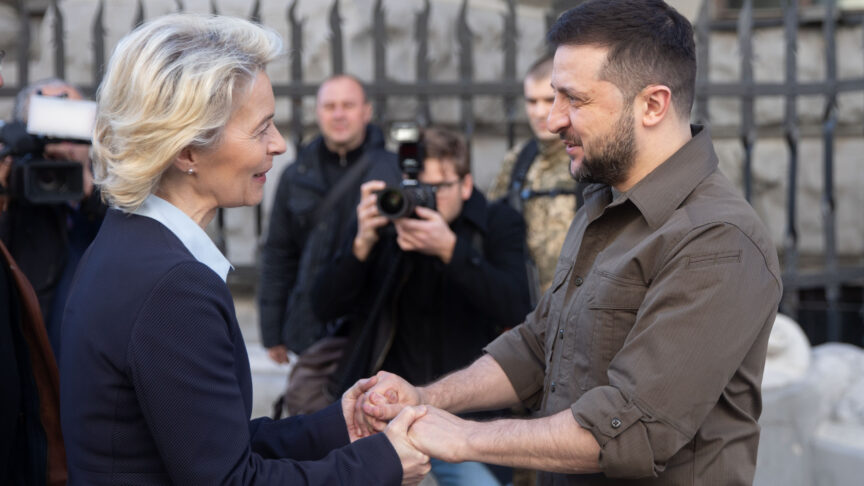
To signal their commitment to Ukraine, Europeans should agree a ‘long-war plan’ of assistance against Russian aggression. This would include a ‘security compact,’ security assurances, and economic and energy support.

The UK government’s vision for Global Britain does not reflect today’s geostrategic realities. Yet the UK can forge an effective foreign policy if it focuses on British strengths, avoids military adventures in distant lands, and finds balanced, effective working relationships with the EU and the US.

ECFR’s policy experts examine what the Taliban takeover means for countries and regions around the world: Europe, the US, the Middle East, Russia, China, Iran, Turkey, and the Sahel
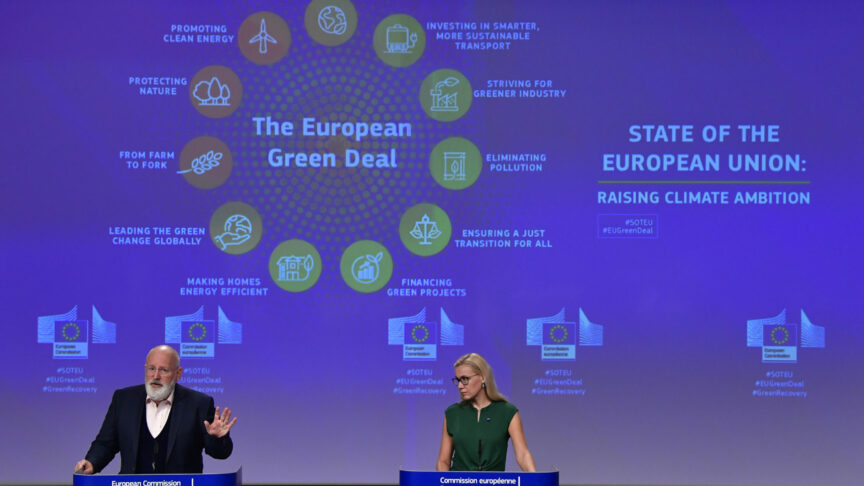
The EU should become a global standard-setter for the energy transition, and prepare to manage the profound geopolitical repercussions of the Green Deal in its relationships with its neighbourhood

To manage in this new world, the EU and its members need to embark on a broad-based effort to recover their strategic sovereignty
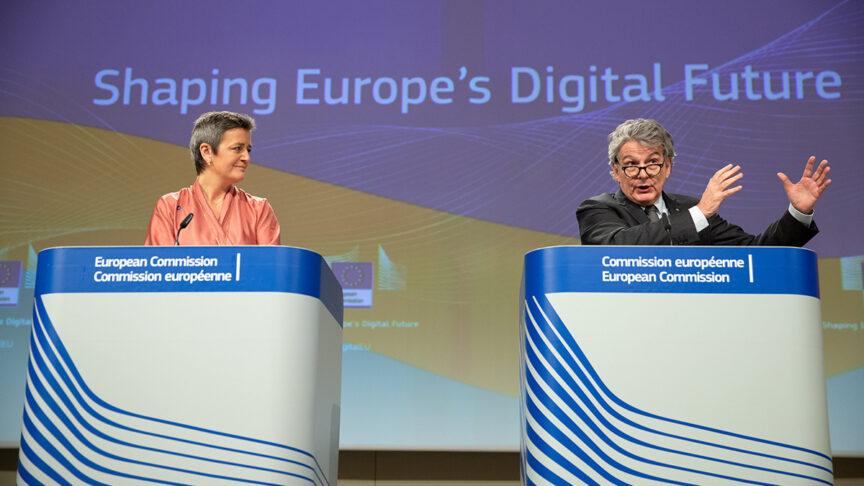
The EU cannot continue to rely on its regulatory power but must become a tech superpower in its own right. Referees do not win the game.
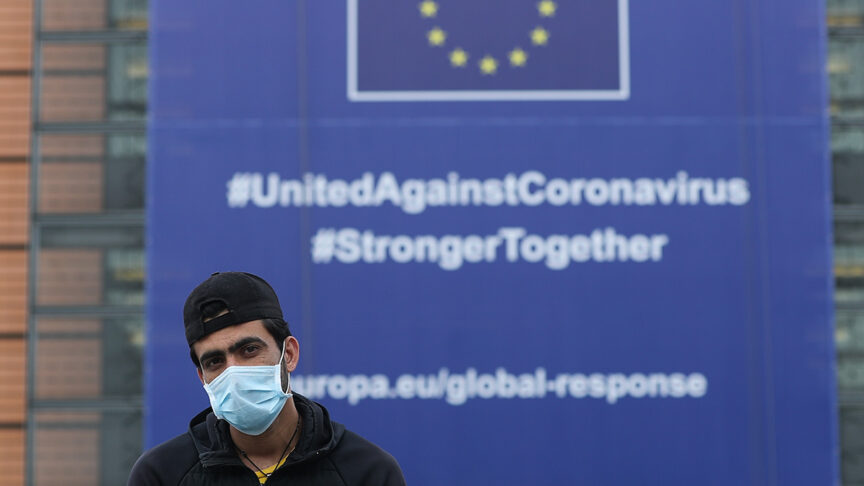
Europe must improve its early warning systems, supply chain resilience, medical R&D, and cyber security and technology, to act decisively in future emergencies
The EU needs to learn to think like a geopolitical power

The apparent omniscience of US intelligence is a valuable strategic asset. In this third instalment of ECFR’s Letters from Washington, Jeremy Shapiro sets out what Europeans can learn from the US intelligence community to boost their diplomatic arsenal
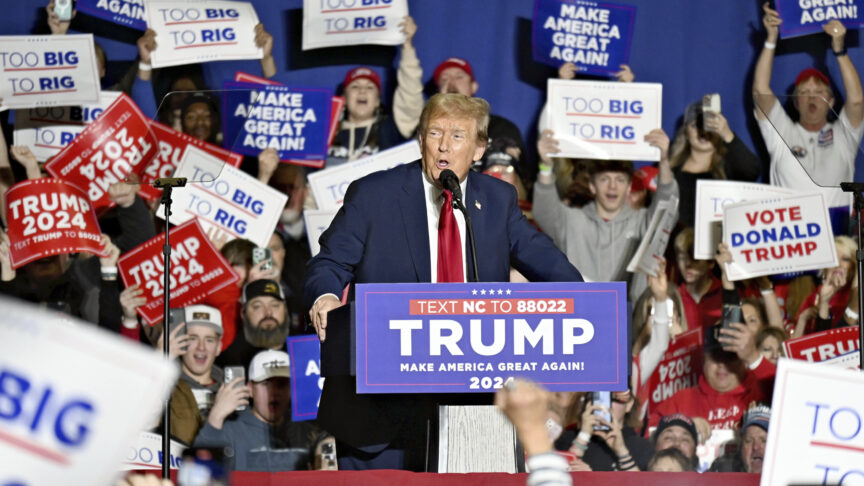
The establishment hates Donald Trump and Trump voters hate the establishment. In this second instalment of ECFR’s Letters from Washington, Jeremy Shapiro explains why Europeans need to understand the dynamics that underpin this toxic relationship
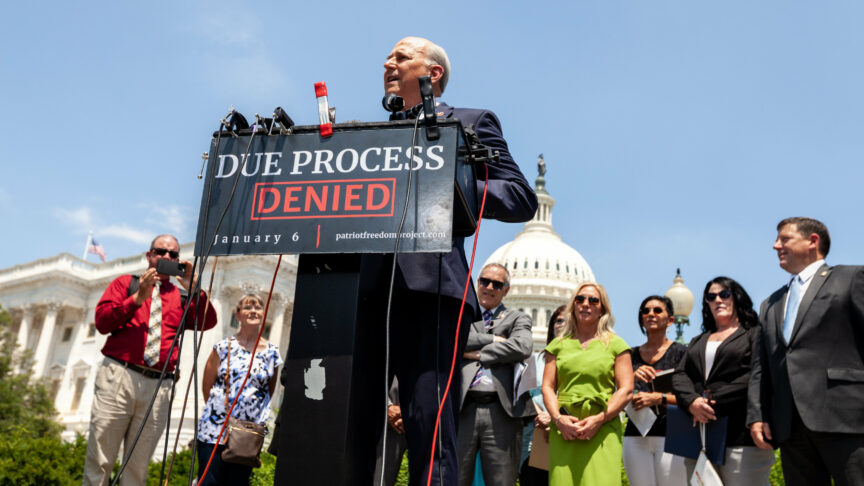
In our new series of letters from Washington, Jeremy Shapiro helps you navigate a US election year that could have profound implications for Europe. In this first instalment, he outlines how campaigns fought on an opponent’s threat to democracy could imperil that very same ideal (and not only in the US)

Ten predictions for the foreign policy trends of 2024, and a little bonus
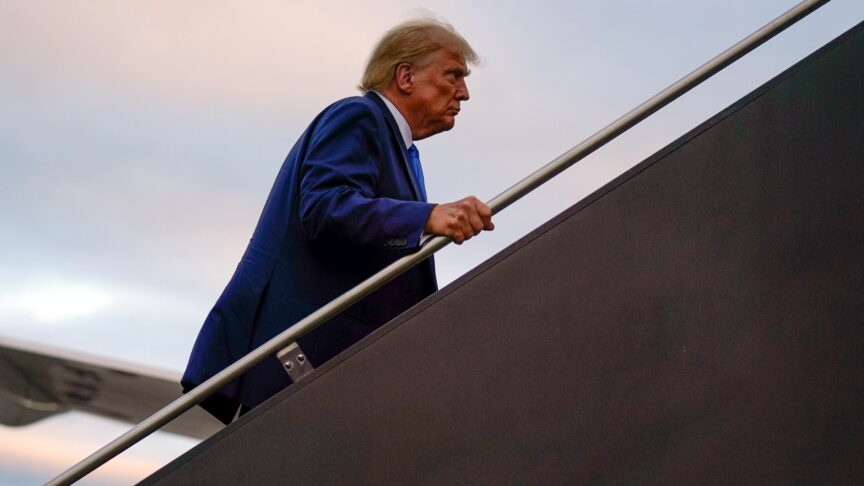
The prospect of Donald Trump’s return to the US presidency has left three Republican tribes vying it out to fill in the details of his hazy foreign policy ambitions
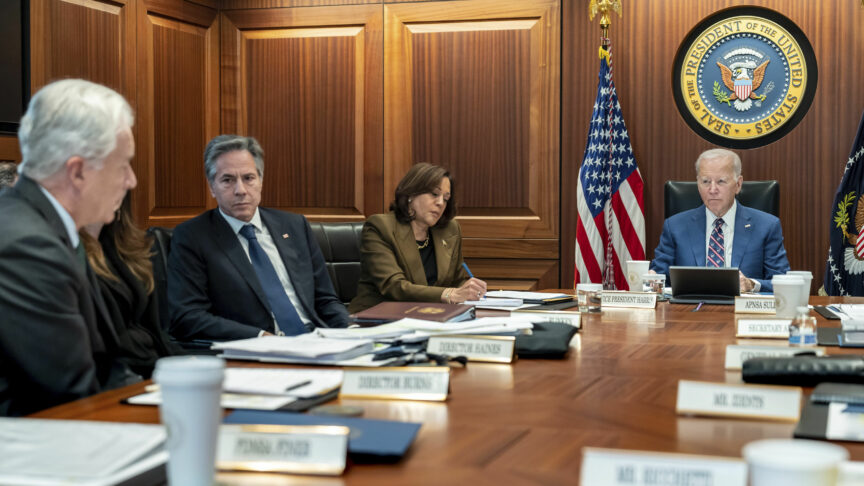
The US too often falls for its own superpower myth and fails to prioritise among its foreign policy commitments – including its present China challenge, which has not gone away

Support in the US for Ukraine will one day soften. Europeans need to formulate their own plan to continue the long war for when it does
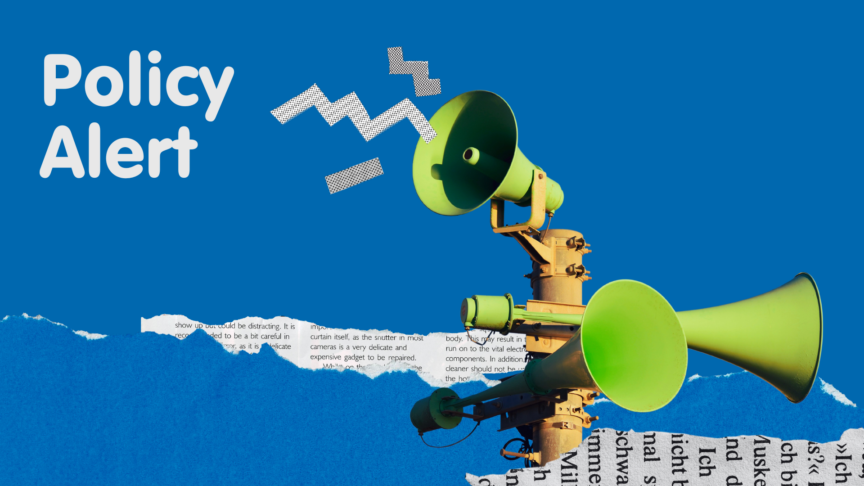
A form of membership offer to Ukraine at NATO’s Vilnius summit will acquire an inexorable momentum of its own

The US and the EU should refrain from making any interventions during Turkey’s election period – but they may need to respond quickly depending on the results of the vote
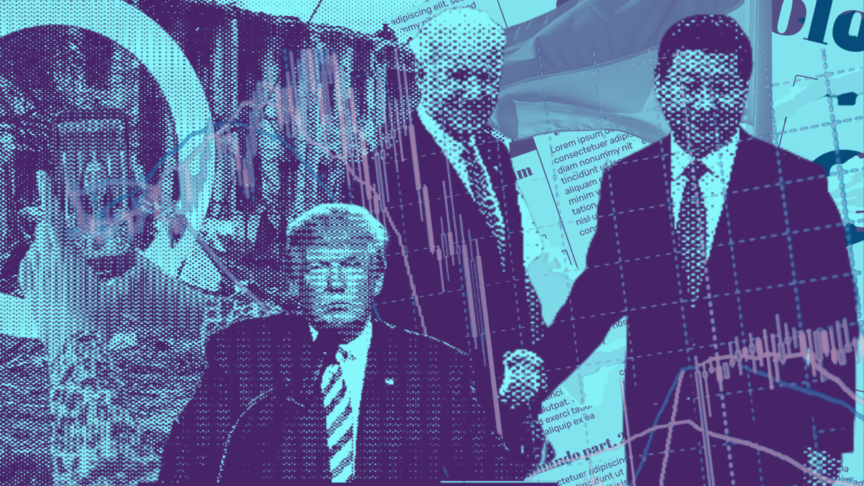
Ten predictions for what’s coming in the world of 2023. Plus a Tik-Tok bonus.
European leaders are underestimating the danger that Trump presents to the transatlantic alliance and assuming too much continuity in the event of a Clinton presidency

Mark Leonard welcomes Alexander Ward and Jeremy Shapiro to discuss Biden’s foreign policy performance

Mark Leonard welcomes Hugh Lovatt, Julien Barnes-Dacey, and Jeremy Shapiro to discuss the current situation in Gaza and the possible futures of the war

Mark Leonard welcomes Gustav Gressel and Jeremy Shapiro to understand what factors will shape a third year of war in Ukraine

Mark Leonard and Jeremy Shapiro lay out ten foreign policy projections for 2024

Jeremy Shapiro welcomes Adebayo Olukoshi, Brian Kagoro, and Theodore Murphy to talk about Africa and the global order

In this week’s episode, Jeremy Shapiro welcomes Michael Kofman and Gustav Gressel to discuss the military situation in Ukraine

Jeremy Shapiro welcomes Cinzia Bianco and Hugh Lovatt to discuss the role of the Persian Gulf in the ongoing conflict in Gaza
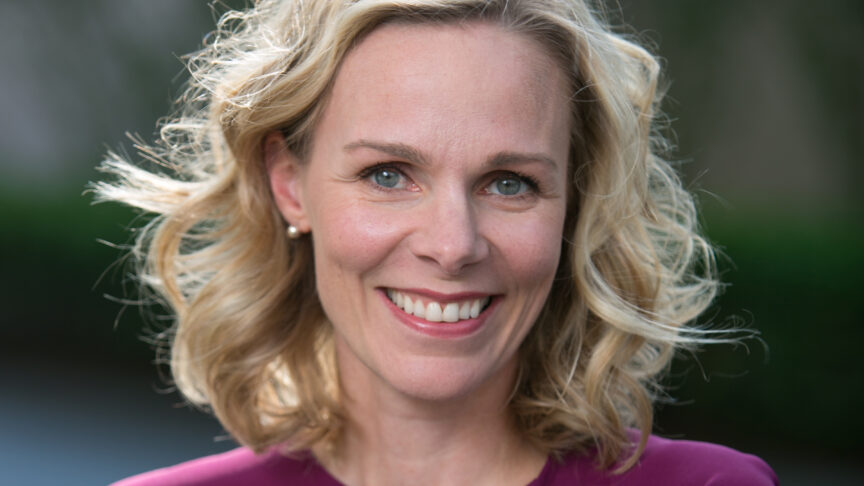
Jeremy Shapiro welcomes Anu Bradford to discuss her new book “Digital Empires” and the race between China, the US, and the EU to regulate tech companies and the digital economy
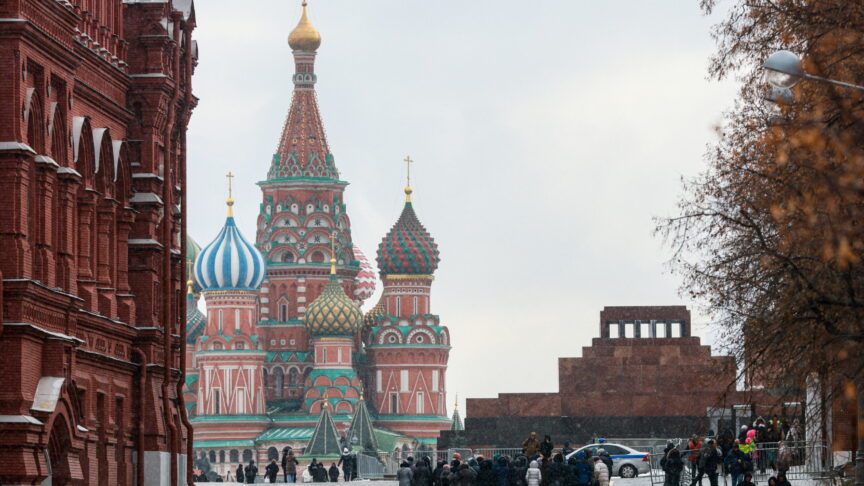
Jeremy Shapiro welcomes Kadri Liik and Valerie Hopkins to discuss what Russian society really thinks about war in Ukraine
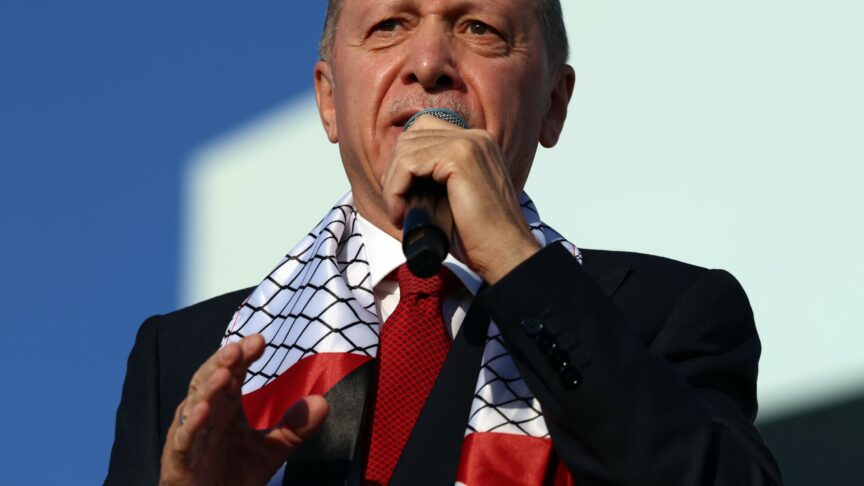
Jeremy Shapiro welcomes Aslı Aydıntaşbaş and Dimitar Bechev discuss what the conflict in the Middle East means for Turkey’s foreign policy
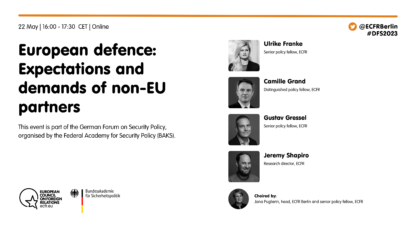
This event is part of the German Forum on Security Policy, organised by the Federal Academy for Security Policy (BAKS).

Rhodium Group are delighted to invite you to the virtual launch event of our new policy paper “Circuit Breakers: Securing the Green Energy Supply Chain”
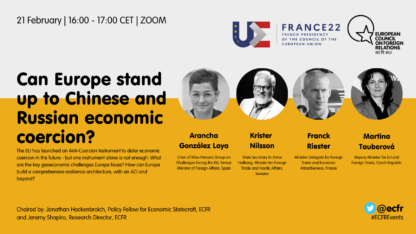
The European Council on Foreign Relations in the context of the French Presidency of the Council of the EU is delighted to invite you to a debate on the principles that should guide Europe’s quest for economic sovereignty
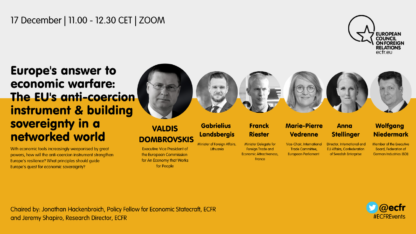
Join ECFR in this two-part event on the EU’s potentially game-changing geopolitical instrument against economic blackmail from great powers, and the principles that should guide Europe’s quest for economic sovereignty
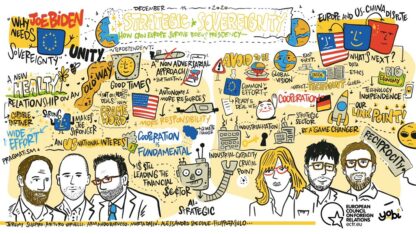
The event will convene a high-level group of Italian decision-makers and opinion shapers across government, business, media and the expert community as well as member of ECFR Council